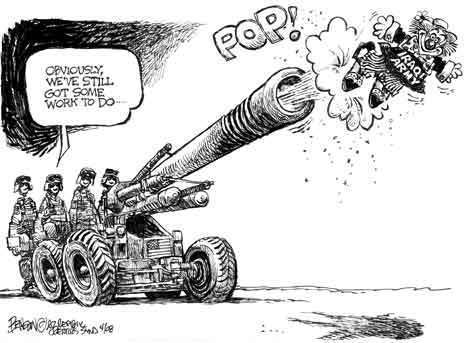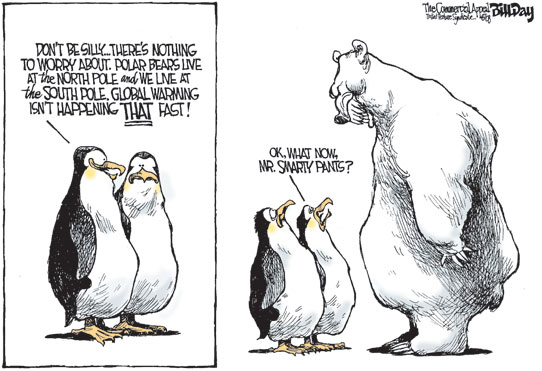
How Hillary Can Knock-Out Obama
Now is the time for Hilary Clinton to take a bold position that in one brilliant, courageous stroke shows the nation that she is more willing to pursue true reforms of the two-party plutocratic political system than Obama is.
With this position she can reveal that all the Obama talk about change is just a clever campaign strategy to seduce people who rightfully are fed up with politics as usual.
With this single position she can transform herself from status-quo-political-establishment-candidate to a true believer in what the Founders gave us in the Constitution: the right to turn public mistrust and lack of confidence in the federal government into peaceful constitutional problem solving. When 81 percent of Americans think the country is on the wrong track, then the constitutional path to reform should be used.
How can a true political leader do better than advocating use of what is sitting right there in our beloved Constitution?
How can a candidate advocating solutions for America do better than supporting what has already been used hundreds of times by the states, but has been blocked by fearful political forces for over 200 years at the federal level?
How could Obama tell the nation that he does not believe in using what the Constitution says we have a clear right to use? How could this self-professed change agent say he is against using the peaceful constitutional path to examining profound political reforms? Neither Obama nor McCain would find it easy to say that what the Founders gave us in our Constitution should not be used. Indeed, as Senators, would they introduce a bill to amend the Constitution to remove this option? I think not.
Sometimes, a great notion just needs to be articulated for people to see the clear way forward. Now is the ideal time for Hillary Clinton to say to Americans that she agrees that the political system must be fixed and that the time has arrived for a serious national discussion of political reforms that only can be achieved through constitutional amendments, because Congress has shown no inclination for pursuing deep, systemic political reforms.
- more -
Coal-fired plants provide over 50 percent of the electricity in the United States and over 83 percent of the global-warming pollution from the power sector. A large coal-fired power plant emits the carbon dioxide equivalent of one million SUVs, and the United States has nearly 500 plants. Because power plants are a generational investment -- the average age of U.S. coal plants is 40 years -- the decision to construct new plants in a world at risk from global warming is monumental. NASA climatologist James Hansen argues that a "firm choice to halt building of coal-fired power plants that do not capture CO2 would be a major step toward solution of the global warming problem." In addition to the pressing issue of climate change -- exacerbated by the surge in coal-fired electricity in the developing world -- "the conventional coal fuel cycle is among the most destructive activities on earth." Coal is contaminated with toxic elements like mercury, arsenic, and lead that end up in the air, water, and soil. The costs of coal are disproportionately borne by the poor communities where it is mined and by children exposed to its pollution.
A GROWTH INDUSTRY: In the United States, "power companies have pushed to build more than 150 new coal-fired power plants." "European countries are slated to build about 50 coal-fired plants over the next five years." "China is completing two new coal plants per week." Since the rise of the Industrial Age, economic growth has been tied to increased electricity demand. Although the price of coal, like all other commodities, is rising to record levels, its economics are attractive to companies wary of the even greater price jump in natural gas, its primary fossil fuel competitor. But part of this drive to build new plants in the United States is driven not by demand, but by political calculus. The United States is poised to join Europe in placing mandatory limits on greenhouse emissions. Electric utilities hope they can successfully lobby for existing plants to be grandfathered into a new system of regulation, as they did in 1970 with the Clean Air Act, shifting the "significant financial and environmental risk" from the companies to everyone else.
- more -
Dear Friend,
 Chip in to Stop Murdoch Before Time Runs Out! |
This morning, the Senate Commerce Committee unanimously approved the "resolution of disapproval" we've been fighting for.
It's the first step toward an official congressional "veto" of the Federal Communications Commission's new rules that gut media ownership limits.
This vote couldn't have come at a more important moment. Just this week, Rupert Murdoch announced plans to buy his third New York newspaper — Newsday. (Murdoch already owns the New York Post, the Wall Street Journal and two television stations in this one media market!)
We can stop this runaway media consolidation by passing the resolution of disapproval in the full House and Senate. To do that, we need your help right now.
Donate to Stop Rupert Murdoch and Big Media.
Time is of the essence. Senate rules require a floor vote on the veto within the next few weeks. So your immediate contribution is critical.
With your support today, the Free Press Action Fund will:
- Line up more senators to support the resolution. We’ve already secured 25 co-sponsors, and we need to exert serious pressure to get the rest. (Murdoch’s greedy grab for Newsday will help, but you can be sure he’ll be fighting us every step of the way.)
- Counteract Big Media’s misinformation campaign. Huge newspaper conglomerates like Murdoch’s News Corp. and Tribune Co. are spending heavily to convince Congress that the FCC rules don't go far enough. They want to swallow up even more local media.
- Setting the record straight. If we can raise enough funding today, part of your contribution will pay for ads to get the attention of Washington decision-makers.
- Reach out to our hundreds of thousands of media reform activists -- and allied groups throughout the country to make sure they flood the Senate with letters, phone calls and e-mails.
Help get this job done -- donate now!
Since the FCC plan was announced in December, more than 250,000 activists have called on Congress to block it. Today's vote is the result — proof that when we pull together behind a clear strategic goal, we get results, even though industry lobbyists outspend us in Washington more than 200-to-1.
The time to stop Murdoch and Big Media is now. I urge you to make your contribution right away.
Gratefully,
Alexandra Russell
Program Director
Free Press Action Fund
www.freepress.net

 In early August of 2006, four weeks after the Lebanese Shiite group Hezbollah, which has as its goal the physical elimination of Israel (and the ancillary ambition of murdering, whenever practicable, Jews elsewhere in the world), killed three Israeli soldiers and kidnapped two more in a cross-border raid, Israel found itself in an exceedingly disagreeable position. The Hezbollah attack had prompted an immediate, and intermittently unrestrained, Israeli military response, which included thousands of bombing runs over Lebanon. The prime minister, the untried Ehud Olmert, a former mayor of Jerusalem who had taken office eight months earlier, promised to obliterate Hezbollah. In the past, Israel had destroyed far greater enemies - the Syrian air force, the Egyptian army, the Arab Legion - so it was assumed that Israel would make short work of Hezbollah, a force consisting of, at most, a few thousand fighters in possession of 12,000 short-range rockets. But within days of Israel's initial attack, it seemed obvious that the Olmert mission was in peril. The Israeli bombardment of Lebanon, which had resulted in the deaths of hundreds of Hezbollah members and innocent civilians, could not stop Hezbollah's rockets from falling on northern Israel. These rocket attacks had killed dozens of Israelis - Arab Israelis included - and had made the Galilee largely uninhabitable. Thousands of Israelis became refugees in their own country, fleeing south in search of shelter.
In early August of 2006, four weeks after the Lebanese Shiite group Hezbollah, which has as its goal the physical elimination of Israel (and the ancillary ambition of murdering, whenever practicable, Jews elsewhere in the world), killed three Israeli soldiers and kidnapped two more in a cross-border raid, Israel found itself in an exceedingly disagreeable position. The Hezbollah attack had prompted an immediate, and intermittently unrestrained, Israeli military response, which included thousands of bombing runs over Lebanon. The prime minister, the untried Ehud Olmert, a former mayor of Jerusalem who had taken office eight months earlier, promised to obliterate Hezbollah. In the past, Israel had destroyed far greater enemies - the Syrian air force, the Egyptian army, the Arab Legion - so it was assumed that Israel would make short work of Hezbollah, a force consisting of, at most, a few thousand fighters in possession of 12,000 short-range rockets. But within days of Israel's initial attack, it seemed obvious that the Olmert mission was in peril. The Israeli bombardment of Lebanon, which had resulted in the deaths of hundreds of Hezbollah members and innocent civilians, could not stop Hezbollah's rockets from falling on northern Israel. These rocket attacks had killed dozens of Israelis - Arab Israelis included - and had made the Galilee largely uninhabitable. Thousands of Israelis became refugees in their own country, fleeing south in search of shelter.
On August 9, Olmert's cabinet authorized a full-scale ground invasion. Israeli troops were already operating inside Lebanon, but in relatively modest numbers. The generals believed that an armored sweep across southern Lebanon could at least push Hezbollah's rocket teams back to the Litani River, well away from the Israeli border.
At the outset of the conflict, in July, Israelis had stood united with Olmert against Hezbollah. Israeli's endless confrontation with the Palestinians is shaded with ambiguities; many Israelis wish to see a Palestinian state come into being in the West Bank and in Gaza, even as they doubt that such a state would bring an end to terrorism. With Hezbollah, there are fewer grays. Its sponsor, Iran, poses the most immediate threat to Israeli's physical existence; many of its leaders are plainly anti-Semitic. Irons president, Mahmoud Ahmadinejad, is a Holocaust denier who has called Israel a filthy bacteria. Hassan Nasrallah, the leader of Hezbollah, has said in a speech, If we searched the entire world for a person more cowardly, despicable, weak and feeble in psyche, mind, ideology and religion, we would not find anyone like the Jew. Notice, I do not say the Israeli.
Because the Hezbollah attack was unprovoked, much of the world had initially expressed sympathy for Israel. This took Israelis by surprise; it had been more than 40 years since they generally received such consideration from the international community. Even Sunni Arab leaders, who fear Shiite radicalism more than they dislike the Jewish state, expressed irritation with Hezbollah.
- more -

TECHSPLOITATION It's been years since I've taught a writing class, and during those years writing has changed completely. Back in the 1990s, I taught writing at UC Berkeley using books and movies. My students would read the books to get a sense of how writing worked, and watch the movies to have something to write about. They got what you might call multimedia input (books, movies) but there was only one possible kind of output: linear narratives written on sheets of paper.
When I taught writing for the past couple of weeks at the Kearny Street Project's Intergenerational Writers Lab, I couldn't imagine teaching writing using books and linear narratives. I taught writing by showing my students how different software applications could help them structure their writing.
Together they built a wiki, a type of Web site that many people can edit at the same time.
Wikis, it turns out, are ideal for exquisite corpses, tales begun by one person and finished by several others. One writer stops, and next one jumps right onto the Web page and continues the story.
Then I made them all join Twitter, a social network I've written about before that lets you to post messages to your friends only if they are 140 characters long or less. You have to communicate succinctly, but engagingly enough to keep people reading. After the whole class had been twittering to one another for a week, we read a chunk of our twitter stream out loud. It sounded like a strange but compelling play, with each of us voicing our own (short) thoughts, sometimes chatting back and forth to each other, and developing odd, poignant themes as time went on.
My students didn't think it was odd to be writing with Web tools. What was unusual to them, I think, was that I referred to the kind of writing that they do all the time as "publishing."
"Writing online isn't publishing; it's posting," one said. Other students said you couldn't really publish fiction online because everyone would assume it was real. At the same time, they felt like nothing online was "real." It wasn't solid, like a book with your name on the spine. I know what they mean. Although most of my publishing is done online, I still write for print publications. But I do so because I see no distinction between online and print: I like publications that exist in both forms; therefore I write for both.
To me, there is one great distinction between print and Internet publishing, and that is storage. Where should I publish if I want people to be able to read what I've said after I die? Books are excellent because they have an interface that holds up easily over time: you open the book and read it. You don't need a particular software program or operating system to make the file open.
But books can be burned. All copies of a book can be wiped out by one crappy political ...
- more -

"The 82nd," the man ahead of me in the security line at the Kansas City airport said. He was 64 and white, very Hank Hill and not the kind of guy you'd typically see chatting up a skinny 20-year-old Latino dude. But they were both veterans. Common ground is a given.
"I was in the 82nd too," the kid told the old man. I looked down. The kid's legs were gone. He was standing on metal. Implausibly and heartbreakingly, white Converses adorned the tips of his prosthetic legs. High tops.
On the other side of the metal detector, I caught up with the young vet (Iraq? Afghanistan?). HomeSec was giving him the whole treatment: arms stretched out, the wand, stern expressions and stupid questions. The wand beeped and beeped. The TSA guy scowled. "I've got titanium all the way up my spine," the kid explained.
You're kidding me, I thought. After what he's been through. After what he's done for his country. I wanted to scream: Bastards! You should wave him around the checkpoint. Here, sir, we'd like to offer you a seat in first class. No, no, no charge.
I bit my tongue. Here in the land of the twee and the craven, I know when to shut up. That's what we do now. Airports are nodes of high-intensity fascism in a nation settling into authoritarianism lite. Hassle the bastards and you might end up dead. I had a flight to catch, doncha know.
Have we, at long last, any decency?
In one respect, the three remaining presidential candidates say, "Yes, we do." They've promised to close Gitmo.
What ought to happen to the nearly 300 detainees is obvious. Hand each of them an apology, a bag of cash--a million bucks wouldn't be nearly enough for what they've been through--and a plane ticket home. Those who can't return to their countries of origin because their U.S.-backed dictatorships would murder them receive a penthouse suite in the U.S. city of their choice.
- more -

This is the kind of thing we forget.
This is the kind of thing that, given all our distractions, our celeb obsessions and happy drugs and bothersome trifles like family and bills and war and health care and sex and love and porn and breathing and death, tends to fly under the radar of your overspanked consciousness, only to be later rediscovered and brought forth and placed directly in front of your eyeballs, at least for a moment, so you can look, really look, and go, oh my God, I had no idea.
The Earth is humming. Singing. Churning out a tune without the aid of battery or string or wind-up mechanism and its song is ethereal and mystifying and very, very weird, a rather astonishing, newly discovered phenomena that's not easily analyzed, but which, if you really let it sink into your consciousness, can change the way you look at everything.
Indeed, scientists now say the planet itself is generating a constant, deep thrum of noise. No mere cacophony, but actually a kind of music, huge, swirling loops of sound, a song so strange you can't really fathom it, so low it can't be heard by human ears, chthonic roars churning from the very water and wind and rock themselves, countless notes of varying vibration creating all sorts of curious tonal phrases that bounce around the mountains and spin over the oceans and penetrate the tectonic plates and gurgle in the magma and careen off the clouds and smack into trees and bounce off your ribcage and spin over the surface of the planet in strange circular loops, "like dozens of lazy hurricanes," as one writer put it.
It all makes for a very quiet, otherworldly symphony so odd and mysterious, scientists still can't figure out exactly what's causing it or why the hell it's happening. Sure, sensitive instruments are getting better at picking up what's been dubbed "Earth's hum," but no one's any closer to understanding what the hell it all might mean. Which, of course, is exactly as it should be.
Because then, well, then you get to crank up your imagination, your mystical intuition, your poetic sensibility — and if there's one thing we're lacking in modern America, it's ... well, you know.
Me, I like to think of the Earth as essentially a giant Tibetan singing bowl, flicked by the middle finger of God and set to a mesmerizing, low ring for about 10 billion years until the tone begins to fade and the vibration slows and eventually the sound completely disappears into nothingness and the birds are all, hey what the hell happened to the music? And God just shrugs and goes, well that was interesting.
Or maybe the planet is more like an enormous wine glass, half full of a heady potion made of horny unicorns and divine lubricant and perky sunshine, around the smooth, gleaming rim of which Dionysus himself circles his wet fingertip, generating a mellifluous tone that makes the wood nymphs dance and the satyrs orgasm and the gods hum along as they all watch 7 billion confused human ants scamper about with their lattes and their war and their perpetually adorable angst, oblivious.
But most of all, I believe the Earth actually (and obviously) resonates, quite literally, with the Hindu belief in the divine sound of OM (or more accurately, AUM), that single, universal syllable that contains and encompasses all: birth and death, creation and destruction, being and nothingness, rock and roll, Christian and pagan, meat and vegetable, spit and swallow. You know?
But here's the best part: This massive wave of sound? The Earth's deep, mysterious OM, it's perpetual hum of song? Totally normal — that is, if by "normal" you mean "unfathomably powerful and speaking to a vast mystical timelessness we can't possibly comprehend."
Indeed, all the spheres do it, all the planets and all the quasars and stars and moons and whirlpool galaxies, all vibrating and humming like a chorus of wayward deities singing sea shanties in a black hole. It's nothing new, really: Mystics and poets and theorists have pondered the "music of the spheres" (or musica universalis) for eons; it is the stuff of cosmic philosophy, linking sacred geometry, mathematics, cosmology, harmonics, astrology and music into one big cosmological poetry slam.
Translation: You don't have to look very far to understand that human beings — hell, all animals, really — adore song and music and tone and rhythm, and then link this everyday source of life straight to the roar of the planet itself, and then back out to the cosmos.
In other words, you love loud punk? Metal? Jazz? Deep house? Saint-Saens with a glass of Pinot in the tub? Sure you do. That's because somewhere, somehow, deep in your very cells and bones and DNA, it links you back to source, to the Earth's own vibration, the pulse of the cosmos. Oh yes it does. To tap your foot and sway your body to that weird new Portishead tune is, in effect, to sway it to the roar of the universe. I mean, obviously.
At some point we'll probably figure it all out. Science will, with its typical charming, arrogant certainty, sift and measure and quantify this "mystical" Earthly hum, and tell us it merely comes from, say, ocean movements, or solar wind, or 10 billion trees all deciding to grow a quarter millimeter all at once. We will do as we always do: oversimplify, peer through a single lens of understanding, stick this dazzling phenomenon in a narrow category, and forget it.
How dangerously boring. I much prefer, in matters mystical and musical and deeply cosmic, to tell the logical mind to shut up and let the soul take over and say, wait wait wait, maybe most humans have this divine connection thing all wrong. Maybe God really isn't some scowling gay-hating deity raining down guilt and judgment and fear on all humankind after all.
Maybe she's actually, you know, a throb, a pulse, a song, deep, complex, eternal. And us, well, we're just bouncing and swaying along as best we can, trying to figure out the goddamn melody.
- more -









No comments:
Post a Comment